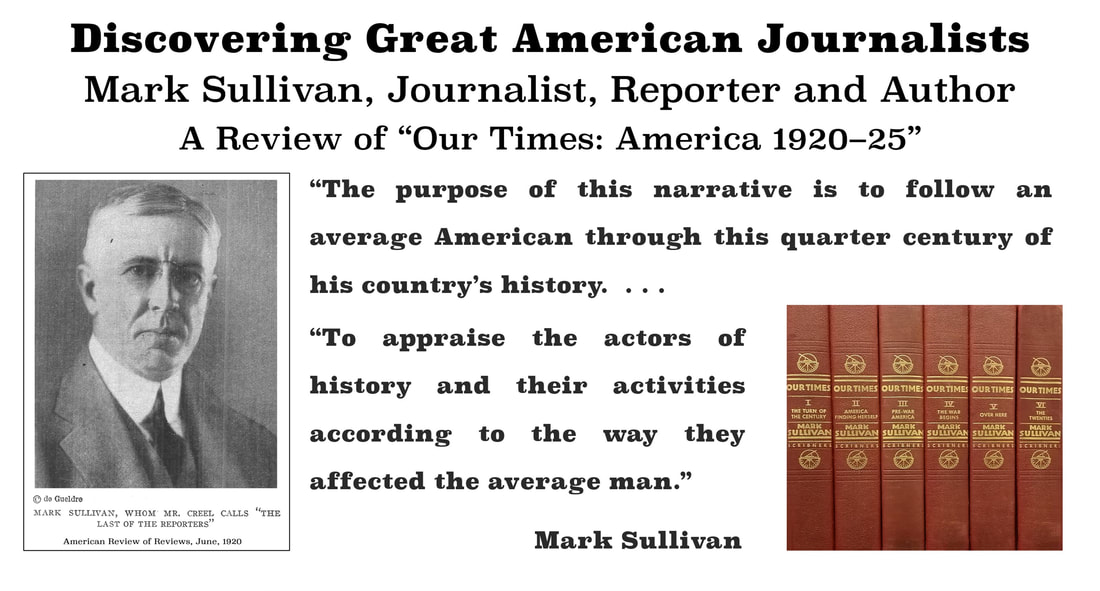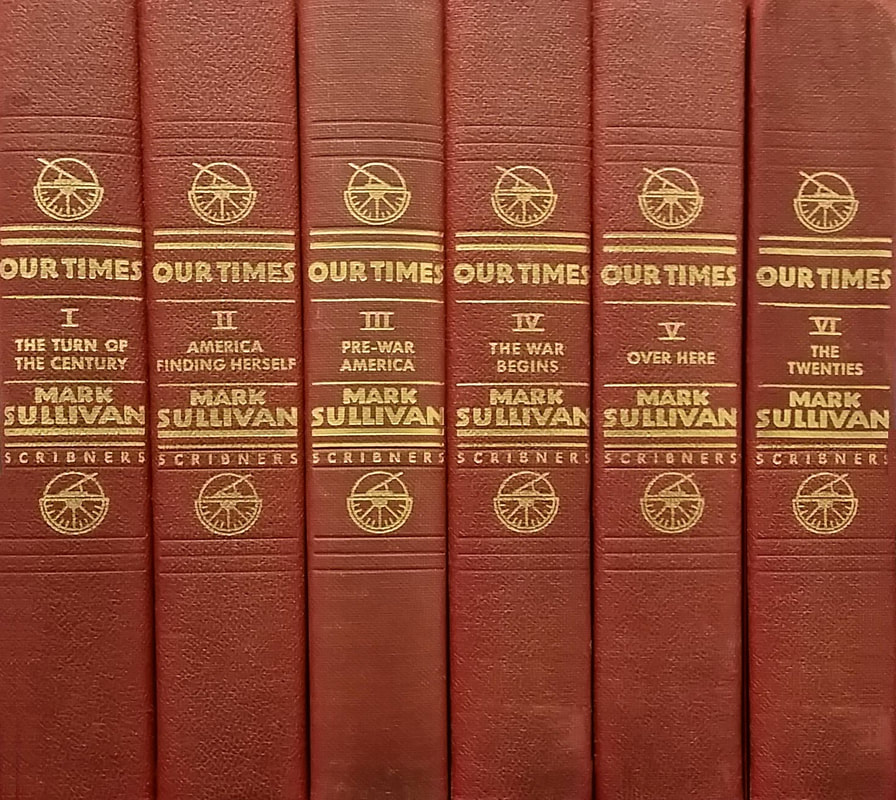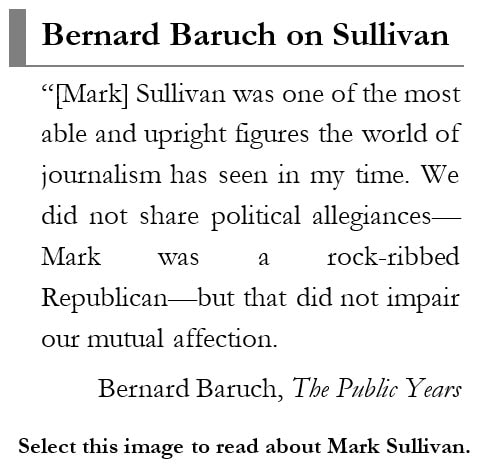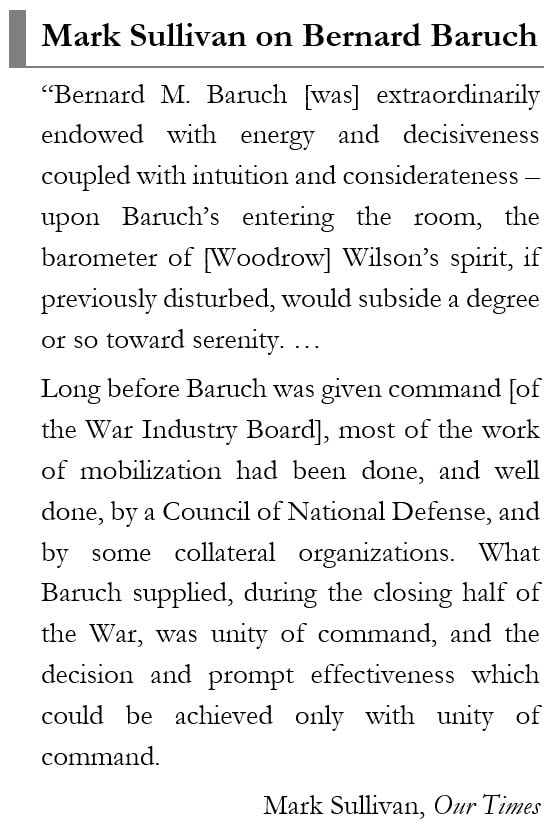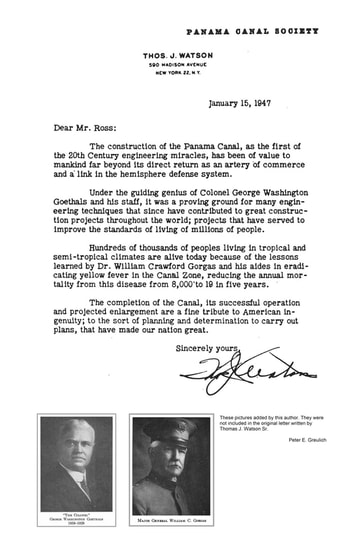A Review of Mark Sullivan's "Our Times: America 1900–1925"
|
|
Date Published: July 6, 2021
Date Modified: October 20, 2023 |
“The purpose of this narrative [Our Times: America 1900-1925] is to follow an average American through this quarter century of his country’s history, to re-create the flow of the days as he saw them, to picture events in terms of their influence on him, his daily life and ultimate destiny.
"The aim is to appraise the actors of history and their activities according to the way they affected the average man, the way he felt about them, the ways in which he was influenced by his leaders, and in which he influenced them.
“The period aimed to be treated is the first quarter of the twentieth century in America, from the beginning of 1900 to the end of 1925.”
"The aim is to appraise the actors of history and their activities according to the way they affected the average man, the way he felt about them, the ways in which he was influenced by his leaders, and in which he influenced them.
“The period aimed to be treated is the first quarter of the twentieth century in America, from the beginning of 1900 to the end of 1925.”
Mark Sullivan, "Our Times"
A Review of "Our Times: America 1900–1925" by Mark Sullivan
- Reviews of the Day: 1926–35
- Insights from "Our Times"
- This Author’s Thoughts and Perceptions
Reviews of the Day: 1926–35
Volumes I through VI were published in 1926, 1927, 1930, 1932, 1933, and 1935, respectively
|
Volume I – 1926: Our Times is one of the most fascinating books that has happened for a long time. … Mr. Sullivan has the most thrilling story in the world to tell, and he has you thinking so, too, within five pages. … as easy to read as the daily paper.
Chicago Tribune, 1926
Volume II – 1927: At last volume two of Mark Sullivan’s Our Times has arrived, and it will be surprising indeed if within another week it is not listed among best-selling non-fiction books. … The unique thing about Sullivan’s method of writing history is that he considers forces that are little noted by the professional historian, and yet, when you come to think of them, they are more potent by far than those forces usually considered.
|
David J. Donnan, The Helena Independent-Record, 1927
Volume III – 1930: These volumes, and those to follow, will soon become the most authoritative sources of information as to the kind and sort of a people we were. … They also preserve those everyday incidentals which in the aggregate constitute a larger share of national life than the doings of governmental officials or the maneuvers of the great captains of industry. … It is one of the very few reference books of great value that are also readable, for the gifted author has told the story in his customary fascinating manner.
The Cincinnati Enquirer, 1930
Volume IV – 1932: It is an impressive panorama, though this reviewer is inclined to quarrel with Sullivan on many of his dogmatic assumptions. He traces the course of American life admirably, but when he assumes to criticize, his judgment frequently seems out of kilter.
H. Allen Smith, The Chillicothe (Missouri) Constitution, 1932
Volume V – 1933: Mr. Sullivan’s fifth volume … measures up well to the preceding four. … The whole five volumes are worth preserving and handing down to the grandchildren.
T. M. Pridgen, The Charlotte News, 1933
Volume VI – 1935: Like previous issues in the series, this volume is good political history. Beyond that it conveys a fair impression of social currents of the time. Mr. Sullivan will be consulted by historians of the future.
The Philadelphia Inquirer, 1935
Don't we—those of us who are now living in the 21st Century, wish that our historians "of the future" consulted this work?
Insights from "Our Times: America 1900–1925"
This is a short excerpt of the changes that took place from 1900 to 1925. A laundry list of what was in 1925 that was not in 1920. These are the changes early Americans experienced in the first quarter of the 20th century! This is the theme of the book and the changes go on for pages and pages and pages.
No multiple choice test in high school could capture this, could it?
On "Negro" music he writes:
His observation on the increasing “encroachment” of government on personal liberties (encroachment is my word, not his):
All of this is from the first few pages of Volume I! My bookmarks are everywhere and in all volumes.
- In his newspapers of January 1, 1900, the American found no such word as radio, for that was yet twenty years from coming; nor “movie,” for that too was still mainly of the future; nor chauffeur, for the automobile was only just emerging … There was no such word as aviator. … Nor was there any mention of income tax or surtax. In 1900, doctors had not heard of insulin; science had not heard of relativity or the quantum theory. Farmers had not heard of tractors, nor bankers of the Federal Reserve System.
Merchants had not heard of chain-stores nor “self-service”; nor seamen of oil-burning engines. Modernism had not been added to the common vocabulary of theology, nor futurist and “cubist” to that of art. Politicians had not heard of direct primaries, nor of the commission form of government, nor of city managers, nor of blocs in Congress, nor of a League of Nations, nor of a World Court. They had not heard of “muck-rakers.”
No multiple choice test in high school could capture this, could it?
On "Negro" music he writes:
- Ragtime and the cake-walk were commonly spoken of as Negro music. More accurately they were expressions of what some metropolitan artisans of music chose to attribute to the Negro. So far as the Negro practiced them they represented not his taste, but the corruption of his taste, his deference to what the other race wanted, especially in New York, where vogues are made. The genuine contributions of the Negro have true beauty, and form a worthy and permanent contribution to the very small body of indigenous American music.
Roosevelt [Theodore] once described the Negro “spirituals” as coming nearer to a true school of American music than anything else. The Negro “spiritual” is as moving a form of art as any race has devised to picture God, eternity, and man’s ultimate destiny. The “spirituals” are so spontaneous, so much a part of the soul of the singer, that not until very recent years has it been possible to get them on paper.
Most of them reflected a poignantly pathetic effort to reconcile the goodness, mercy, and justice of a God sincerely believed in, with the conditions of slavery.
His observation on the increasing “encroachment” of government on personal liberties (encroachment is my word, not his):
- One might suggest there is here something like a law of physics: the amount of regulation the individual must endure is in direct relation to density of population multiplied by velocity of its units. … Submission to greater regulation by government, the appearance of “verbotens” in America, was caused chiefly by increasing density of population.
The more man was obliged to rub elbows against his neighbor, and to feel the rub of his neighbor’s elbow, the more did regulation become inevitable. The tendency was accelerated by what may be called the increased velocity of man, brought about by the automobile and other developments of machinery.
All of this is from the first few pages of Volume I! My bookmarks are everywhere and in all volumes.
This Author’s Thoughts on Mark Sullivan’s "Our Times"
|
The first comment I will make is that Mark Sullivan accomplishes his purpose in this massive, thoroughly enjoyable work.
“The purpose of this narrative is to follow an average American through this quarter century of his country’s history, to re-create the flow of the days as he saw them, to picture events in terms of their influence on him, his daily life and ultimate destiny. The aim is to appraise the actors of history and their activities according to the way they affected the average man, the way he felt about them, the ways in which he was influenced by his leaders, and in which he influenced them. |
“The period aimed to be treated is the first quarter of the twentieth century in America, from the beginning of 1900 to the end of 1925.”
|
Select this image to read about Bernard Baruch.
|
I felt as though I was there, and the experiences involved such a variety of subjects that this work will be a constant resource to most historians.
These experiences included:
|
What Mark Sullivan seems to do best is apply the human factor to all these advancements, such as the elimination of yellow fever and the hookworm in the South which saved millions of lives and returned them back to lives of productivity rather than listlessness.
This book should be mandatory reading for American History in either high school or college. A genuine work of art that is being lost in time. "Our Times: America 1900-1925" will be one of my top go-to reference guides of early 20th Century American history. Cheers, Pete |
Tom Watson highlighting the humanitarian benefits of building the Panama Canal.
|
